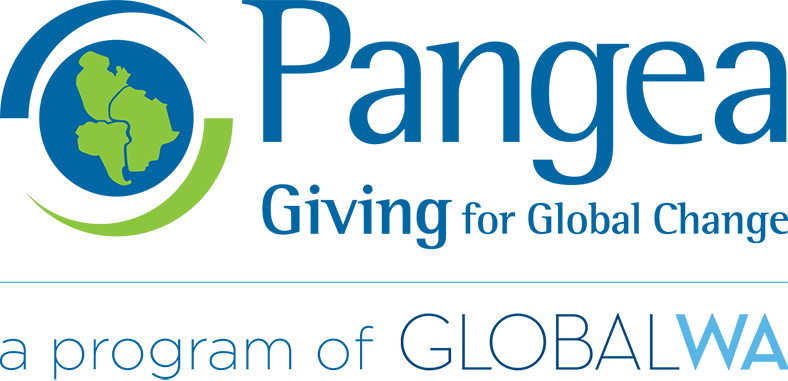Just In: Cambodia & Thailand Site Visit Journals!
Our 2013 Asia site visits are in full swing, starting off Pangea’s new year with a much anticipated trip to three countries. Part of the group started in Cambodia on 1/6 and the entire site visit met up last Thursday, 1/10 in Thailand. Today, the entire team is off to Burma (Myanmar), for a 10 day adventure of visiting and evaluating potential new grant partners. Following is their journal straight from the field, covering their visits to current Pangea partners in Cambodia and Thailand. The Burma piece will follow upon completion of those visits. So stay tuned and please join us in sending best wishes for a safe and fruitful journey to the entire team! 1/15/2013
CAMBODIA 1/6-1/8
1/6: Ross, Jill, and Cathy safely arrived in Phnom Penh.
!/7: We took a Tuk Tuk to the Killing Fields Memorial. It was a highly emotional experience. In Battambang, we met with Thangdy, who, although does not have the title, is 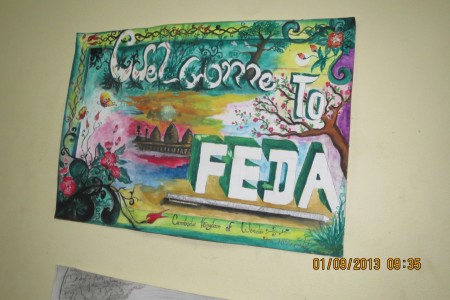 running FEDA, one of our current grant partners on a day to day basis. He is very charismatic and highly competent. Ngarm, the Director joined us at FEDA later in the morning. FEDA is 51% funded by income generating projects. Currently that includes running a mini-mart and renting kayaks. The kayak coordinator was sent to our hotel to take us to the FEDA facility thought we were kayak clients. We assured him that we were not–although it would have been an adventure. With part of the money from Pangea, they recently bought ducks and plan to sell the eggs in the local area. They have also built a smoke house and plan to sell smoked meat and sausages.
running FEDA, one of our current grant partners on a day to day basis. He is very charismatic and highly competent. Ngarm, the Director joined us at FEDA later in the morning. FEDA is 51% funded by income generating projects. Currently that includes running a mini-mart and renting kayaks. The kayak coordinator was sent to our hotel to take us to the FEDA facility thought we were kayak clients. We assured him that we were not–although it would have been an adventure. With part of the money from Pangea, they recently bought ducks and plan to sell the eggs in the local area. They have also built a smoke house and plan to sell smoked meat and sausages.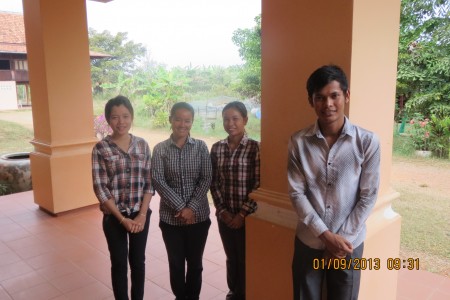 Projects that Pangea has funded in the past have been closed. FEDA is no longer teaching sewing because there is too much competition and the graduates did not want to mentor new students. The beauty school has also been basically closed. There are no classes being taught, but the facility remains “open” although we did not see any customers. The primary activity is teaching English to students from 10 years to 20 years old after public school ends. FEDA is now charging a small fee because when it was free there were too many students who did not really want to learn. We were very impressed with the teachers and the students that we saw. During the English classes the students asked us our ages, where we lived and what we did for work. It was great fun interacting with the students. The next day, 1/8, we were driven to Tean Thor’s facility, another Pangea partner, located in a rural area with pot holes in the dirt road big enough to swallow a truck. It was an exciting day
Projects that Pangea has funded in the past have been closed. FEDA is no longer teaching sewing because there is too much competition and the graduates did not want to mentor new students. The beauty school has also been basically closed. There are no classes being taught, but the facility remains “open” although we did not see any customers. The primary activity is teaching English to students from 10 years to 20 years old after public school ends. FEDA is now charging a small fee because when it was free there were too many students who did not really want to learn. We were very impressed with the teachers and the students that we saw. During the English classes the students asked us our ages, where we lived and what we did for work. It was great fun interacting with the students. The next day, 1/8, we were driven to Tean Thor’s facility, another Pangea partner, located in a rural area with pot holes in the dirt road big enough to swallow a truck. It was an exciting day 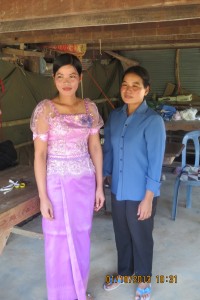 of viewing the various projects and seeing the clothing that the students of the Pangea funded sewing classes made. We started the day with a rousing song from the band that is part of a music program funded by another NGO. It was a “rock” band with a fabulous singer. Although it was mostly an all boy band, a young woman played a guitar. Tean Thor’s facilities include a music building, a computer building that does not have internet access, a classroom building for English instruction and a sewing building. Pangea funds the sewing apprenticeship
of viewing the various projects and seeing the clothing that the students of the Pangea funded sewing classes made. We started the day with a rousing song from the band that is part of a music program funded by another NGO. It was a “rock” band with a fabulous singer. Although it was mostly an all boy band, a young woman played a guitar. Tean Thor’s facilities include a music building, a computer building that does not have internet access, a classroom building for English instruction and a sewing building. Pangea funds the sewing apprenticeship 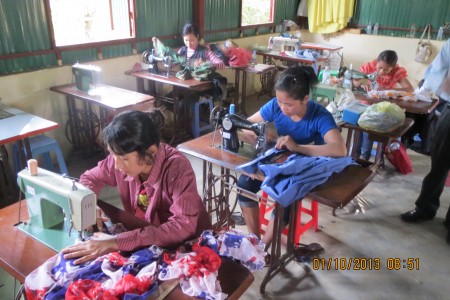 program. The students entering the program have basic sewing skills and may have worked in garment factories. This program teaches them how to cut material, sew to patterns and do the fancier work of collars, appliqué, etc. so they can make custom clothes. After completing 6 months at the Tean Thor facility they go to Otaki where Tean Thor has a shop. There they further improve their skills and make intricate wedding and special events clothes. This is another 6 month commitment. We were impressed with the quality of clothes produced but wondered how they manage with no electricity and very poor light. They work from 6.00am to 6.00pm. We visited a couple of graduates who have their own business in their houses. They are doing very good work. Tean Thor maintains follow-up with those who stay in the area providing assistance with business issues and help with mastering any new techniques or fashions.
program. The students entering the program have basic sewing skills and may have worked in garment factories. This program teaches them how to cut material, sew to patterns and do the fancier work of collars, appliqué, etc. so they can make custom clothes. After completing 6 months at the Tean Thor facility they go to Otaki where Tean Thor has a shop. There they further improve their skills and make intricate wedding and special events clothes. This is another 6 month commitment. We were impressed with the quality of clothes produced but wondered how they manage with no electricity and very poor light. They work from 6.00am to 6.00pm. We visited a couple of graduates who have their own business in their houses. They are doing very good work. Tean Thor maintains follow-up with those who stay in the area providing assistance with business issues and help with mastering any new techniques or fashions.
THAILAND 1/12-1/14
1/12- Everyone is here! We started the day with quick hellos then had our first meeting with Seri Tongmak, the executive director of Pattanarak 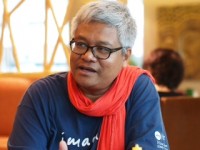 Foundation. Many Pangea members met Seri in Seattle back in 2011 at a Pangea education event. Pattanarak was formed in 2004 to assist disadvantaged migrants living on the border. They have recently narrowed their focus to work exclusively with groups on the SW border with Myanmar. Pattanarak programs include HIV education and prevention and community savings groups. We talked mainly about the savings groups. Of their 21 savings groups four are on the Myanmar side of the border in Mon state. Savings groups provide loans for a variety of purposes including healthcare, small development projects and even cremations. But the real benefit is building community and empowerment. Seri hopes to do more work across the border. Many NGO’s are opening in Rangoon but they will not support border areas. We asked Seri what he hoped for Pattanarak’s future. He described it as raising a child. There are three7 year periods of development. The first 7 years you are trying to survive. The second 7 years you start to encourage your colleagues to think about the long term and commitment to the future. The third 7 years you turn ownership over to the local community and continue as an advisor. Pattanarak is currently in it’s 12th year. Seri was wearing a John Lennon tee shirt and his signatory red scarf. The afternoon was spent at a very large weekend market. The market covers 35 acres with 15,000 vendors and 200,000 visitors each day. We traveled by sky train to the market then took cabs to vis
Foundation. Many Pangea members met Seri in Seattle back in 2011 at a Pangea education event. Pattanarak was formed in 2004 to assist disadvantaged migrants living on the border. They have recently narrowed their focus to work exclusively with groups on the SW border with Myanmar. Pattanarak programs include HIV education and prevention and community savings groups. We talked mainly about the savings groups. Of their 21 savings groups four are on the Myanmar side of the border in Mon state. Savings groups provide loans for a variety of purposes including healthcare, small development projects and even cremations. But the real benefit is building community and empowerment. Seri hopes to do more work across the border. Many NGO’s are opening in Rangoon but they will not support border areas. We asked Seri what he hoped for Pattanarak’s future. He described it as raising a child. There are three7 year periods of development. The first 7 years you are trying to survive. The second 7 years you start to encourage your colleagues to think about the long term and commitment to the future. The third 7 years you turn ownership over to the local community and continue as an advisor. Pattanarak is currently in it’s 12th year. Seri was wearing a John Lennon tee shirt and his signatory red scarf. The afternoon was spent at a very large weekend market. The market covers 35 acres with 15,000 vendors and 200,000 visitors each day. We traveled by sky train to the market then took cabs to vis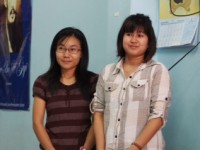 it the Myanmar Development Fund (MDF). MDF was started by Burmese University students. They provide health education and accompaniment to government hospitals. They also run a primary school using a Burmese curriculum. Parents are migrants working in one of the 5 nearby markets. The programs are run by volunteer University students and the local community and is self sustaining. I talked to two young women studying nursing. Both plan to return to Burma when they graduate this year. They are optimistic changes in the new government will increase the number of international NGOs in Burma and job opportunities.
it the Myanmar Development Fund (MDF). MDF was started by Burmese University students. They provide health education and accompaniment to government hospitals. They also run a primary school using a Burmese curriculum. Parents are migrants working in one of the 5 nearby markets. The programs are run by volunteer University students and the local community and is self sustaining. I talked to two young women studying nursing. Both plan to return to Burma when they graduate this year. They are optimistic changes in the new government will increase the number of international NGOs in Burma and job opportunities.
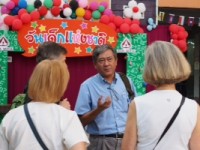 1/13: Meeting with TACDB and visit to their Sunday school. We spent the day with Myint Wai, Deputy Director for TACDB. Our first visit was their Sunday School located in a Thai primary school. The school is used on Sundays for adult language classes and computer training for Burmese migrant workers. Optional classes are offered on topics related to human rights, law and democracy. Students wear uniforms to build community and decrease ethnic tensions. Classes are held all day on Sunday. Language classes are in English, Thai and Burmese. There are 38 classrooms. Students can sign up for one class or several classes. There are over 1,000 registered students and 600-700 attending classes each week. In addition to the Sunday School TACDB has small learning centers in several other locations. These schools operate on Sundays and two weekdays. Teachers are volunteer. Pangea has been funding legal aid clinics and education on labor laws for migrant workers for 4 years. The program was started with a 5 year grant from OSI. That grant ended in 2012. Pangea is now the only funder. The Pangea grant will pay the salary of one graduate student to do triage and referral. Myint is looking for additional funding to support this program. We met other TACDB staff including the Financial Officer and Legal advocate and the chair of the board.
1/13: Meeting with TACDB and visit to their Sunday school. We spent the day with Myint Wai, Deputy Director for TACDB. Our first visit was their Sunday School located in a Thai primary school. The school is used on Sundays for adult language classes and computer training for Burmese migrant workers. Optional classes are offered on topics related to human rights, law and democracy. Students wear uniforms to build community and decrease ethnic tensions. Classes are held all day on Sunday. Language classes are in English, Thai and Burmese. There are 38 classrooms. Students can sign up for one class or several classes. There are over 1,000 registered students and 600-700 attending classes each week. In addition to the Sunday School TACDB has small learning centers in several other locations. These schools operate on Sundays and two weekdays. Teachers are volunteer. Pangea has been funding legal aid clinics and education on labor laws for migrant workers for 4 years. The program was started with a 5 year grant from OSI. That grant ended in 2012. Pangea is now the only funder. The Pangea grant will pay the salary of one graduate student to do triage and referral. Myint is looking for additional funding to support this program. We met other TACDB staff including the Financial Officer and Legal advocate and the chair of the board.
1/14: Meeting with ECCSD at our hotel in Bangkok. Today we met with Da (Jitlada) from ECCSD. Da gave us a brief history of the organization and 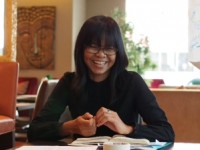 some of her background working with NGOs. In 2007 the Education Development Center (a Thai NGO) developed a program to work with disadvantaged kids in Phang-nga Province. Da was hired as program manager. This was a pilot program funded by UNICEF. The program worked with 18 schools to help Burmese students enroll in schools. There was a lot of discrimination based on the history of conflict between Thailand and Burma. Funding for the pilot ended in 2010. At that point they had students and teachers that wanted to continue this work so they formed an NGO. The first year they had no budget. Initially Da relied on family and friends and then received a grant from the Hussman Foundation. Pangea’s first grant was in 2011. ECCSD is a small organization with a big impact. For the first two years ECCSD focused on stakeholder participation. Teachers, students and parents are all included in program planning and implementation. Students are trained as leaders and mentors for other students. ECCSD has expanded to 27 communities in 5 districts. For 2113 ECCSD has identified 2 Main goals: 1. Develop education model accessible for migrant youth ages 14-18. Some of these youth have not attended primary school. 2. Peaceful living between locals and migrants – ECCSD would like to add cultural training for Burmese and Thai students and teachers. ECCSD plans to start this as an after school program with volunteers and hope it will eventually become part of the curriculum. ECCSD has only 3 staff and Da does not expect the organization to grow. Their model is to start a program in a community with the goal of training students, teachers, parents and administrators to continue the programs when ECCSD leaves. Students and teachers become mentors for their peers. The long term goal is for the programs to be run by volunteers with ECCSD as advisors.
some of her background working with NGOs. In 2007 the Education Development Center (a Thai NGO) developed a program to work with disadvantaged kids in Phang-nga Province. Da was hired as program manager. This was a pilot program funded by UNICEF. The program worked with 18 schools to help Burmese students enroll in schools. There was a lot of discrimination based on the history of conflict between Thailand and Burma. Funding for the pilot ended in 2010. At that point they had students and teachers that wanted to continue this work so they formed an NGO. The first year they had no budget. Initially Da relied on family and friends and then received a grant from the Hussman Foundation. Pangea’s first grant was in 2011. ECCSD is a small organization with a big impact. For the first two years ECCSD focused on stakeholder participation. Teachers, students and parents are all included in program planning and implementation. Students are trained as leaders and mentors for other students. ECCSD has expanded to 27 communities in 5 districts. For 2113 ECCSD has identified 2 Main goals: 1. Develop education model accessible for migrant youth ages 14-18. Some of these youth have not attended primary school. 2. Peaceful living between locals and migrants – ECCSD would like to add cultural training for Burmese and Thai students and teachers. ECCSD plans to start this as an after school program with volunteers and hope it will eventually become part of the curriculum. ECCSD has only 3 staff and Da does not expect the organization to grow. Their model is to start a program in a community with the goal of training students, teachers, parents and administrators to continue the programs when ECCSD leaves. Students and teachers become mentors for their peers. The long term goal is for the programs to be run by volunteers with ECCSD as advisors.
Dinner meeting with Phil Robertson, Human Rights Watch, Deputy Director for Asia: Phil joined us for dinner and shared information on current situation in Burma. While the government has made some positive changes there are still area of serious fighting between ethnic groups in Arakan state and military attacks in Kachin state.
Stay tuned for Field Updates From Burma in the next 10 days or so!
.
